May 18, 2025 | 05:57 GMT +7
May 18, 2025 | 05:57 GMT +7
Hotline: 0913.378.918
May 18, 2025 | 05:57 GMT +7
Hotline: 0913.378.918
On the afternoon of September 28, 2023, the news of Dr. M. S. Swaminathan's passing at the age of 98 in Chennai, India, spread across the social media. The people of India and in many countries around the world were shocked and expressed deep bereavement for the loss of the father of the green revolution in India who played a crucial role in leading this densely populated country from a state of severe food scarcity to food self-sufficiency and subsequently to becoming a leading global exporter of food. Mr. Le Minh Hoan, Minister of Agriculture and Rural Development of Vietnam sent a condolence letter to the agricultural sector, the people, and Dr. Swaminathan's family.
Dr. Swaminathan's peaceful departure left behind a profound legacy accumulated over his 70-year journey, which was closely intertwined with the agricultural fields and the changing seasons. This distinguished individual, born into a relatively affluent family, made the choice to pursue studies in agriculture at the university. Subsequently, he disclosed that his decision had surprised and saddened his mother, who had aspired for him to study medicine to follow in his father's footsteps as a physician. To the question of what motivated his decision, Dr. Swaminathan explained that the devastating famine in Bengal (now part of Bangladesh) in 1943, resulting in the tragic loss of 3 million lives, had a profound impact on his feeling and drew him towards agriculture, the sector responsible for producing sustenance for humanity.
After graduating from university, Dr. Swaminathan followed post-graduation at the most prestigous universities in the world, including Wageningen University in the Netherlands, the University of Cambridge in the United Kingdom, and the University of Wisconsin in the United States. After completing his postdoctoral research at the University of Wisconsin, despite being offered an academic position as an associate professor at the University of Wisconsin, Dr. Swaminathan made the pivotal decision to return to his homeland at the age of 29 in early 1954, initiating a new chapter in his life. It was from this juncture that the seeds of the Green Revolution were sow.
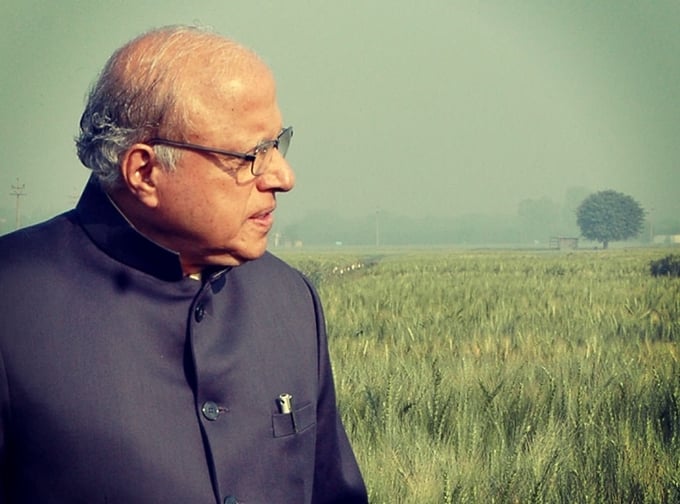
Dr. Swaminathan, the father of India's Green Revolution - a farmers’ scientist.
Dr. Swaminathan, the world-renowned agricultural scientist who was recognized by Time magazine as one of the 20 most influential figures in Asia in the 20th century, was a man deeply concerned about the welfare of farmers. His daughter, Dr. Soumya Swaminathan, former Deputy Director General and a leading scientist at the World Health Organization (WHO), announced the news of her father's passing through a short video clip on social media. With her father's remarkable legacy, she only stated, "Till the end, he was committed to the farmers' welfare and to the upliftment of the poorest in society. He recognized that women are neglected in agriculture and had taken a lot of initiatives to promote women's empowerment"
Prime Minister Narendra Modi of India honored Dr. Swaminathan in his article dated October 7, 2023, recognizing him as a farmers’ scientist rather than simply an agricultural scientist. Prime Minister Narendra Modi wrote, "In his heart there was a farmer”.
Dr. Swaminathan held the firm belief that the accomplishments in agricultural production were attributable to the farmers, who bear direct responsibility for food production. Farmers, he emphasized, were the cornerstone of food production, and their vital role in this regard could not be overstated. Consequently, he underscored the imperative for a collaborative and supportive relationship among the government, scientific community, and farmers. Furthermore, Dr. Swaminathan stressed the necessity of integrating scientific and technological advancements, government policies, and the practical wisdom gained from farmers' experiences. During his tenure as the Chairman of the National Commission on Farmers from 2004 to 2006, where he provided counsel to the government on agricultural and farming policies, he submitted a total of five reports.
Shortly after his passing, one of these reports gained significant attention in the Indian media. Accordingly, this report recommended the establishment of a minimum support price (MSP) for crops, which was calculated to cover the full cost of production in addition to a 50% margin. Under this MSP framework, farmers would invariably accrue profits, as it represents the minimum price at which the government procures agricultural produce for strategic reserves or intervenes in the market when prices fall below this threshold.
The people of India believe that the most meaningful tribute the government could offer in Dr. Swaminathan's honor would be the full implementation of his recommendations. The MSP regimen currently enforced by the government does not fully align with Dr. Swaminathan's formulated approach.
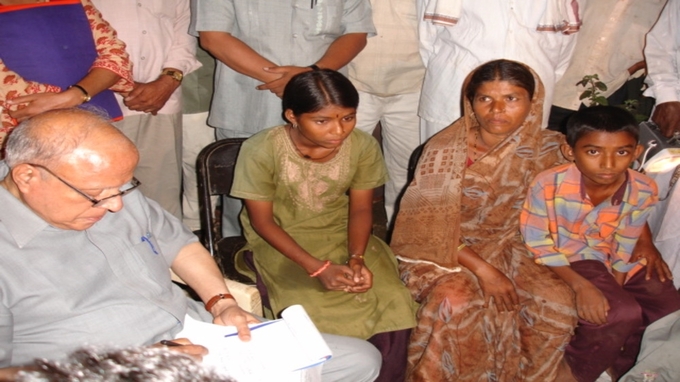
Dr. Swaminathan (left) studying the livelihoods of rural farmers.
Dr. Swaminathan recognized the limitations of the Green Revolution due to the overuse of inputs (pesticides, herbicides, chemical fertilizers, groundwater, etc.) negatively affecting the ecological environment and reducing biodiversity. As a result, he initiated a transition from the Green Revolution to the Evergreen Revolution, based on the principles of ecological agriculture with the goal of achieving productivity in perpetuity without causing ecological and social harm. The Evergreen Revolution in India emphasizes the following aspects:
- Emphasizing social justice and gender equality in sustainable development goals.
- Enhancing food security, which is synonymous with nutritional security, integrating agriculture, health, and nutrition as a unified effort for human health, at the national, local and household levels.
- Evaluating agricultural progress through statistical production growth as well as the increasing farmers’ income.
Dr. Swaminathan exemplified the principles of the Sustainable Green Revolution through his concrete actions. After returning from the International Rice Research Institute (IRRI) in 1988, he used the entire prize money awarded to him from the World Food Prize to establish the M.S. Swaminathan Research Foundation in Chennai, India. The Foundation's activities focus on supporting (1) nature and the environment, (2) the impoverished, (3) women, and (4) rural employment. Many of his initiatives, such as developing Eco-villages, Information Village Resource Centers, restoring mangrove forests, and development of salt-tolerant crop varieties, have been implemented at the Foundation. He advocated for enhancing the technological capabilities of farmers through information technology services delivered to villages and households. He emphasized the need to maintain long-term soil fertility, stating that "if the soil is hunger (degraded) and thirsty (water deficiency), it cannot nourish humanity."
Dr. Swaminathan posited that scientific and technological advancements possess a neutral characteristic; namely, they can be beneficial when employed correctly and detrimental when misused or abused. The demarcation between right and wrong primarily hinges on governmental policies. Effective policies, he asserted, can unlock the positive potential of science and technology, and the constructive aspects of innovation, whereas inadequate policies could have the opposite effect.
Dr. Swaminathan consistently underscored the symbiotic relationship between science, technology, and governmental policies. He often cited an anecdote from the initiation of the Green Revolution, emphasizing the crucial role played by Prime Ministers Jawaharlal Nehru and Indira Gandhi. Prime Minister Nehru had famously stated, "Everything else can wait, but not agriculture." Dr. Swaminathan also recalled a conversation with Prime Minister Indira Gandhi, who, in the face of an impending famine, earnestly inquired, "Is there any way to end food scarcity?"
Dr. Swaminathan delineated three concurrent research directions in agriculture. Firstly, participatory research that actively involves farmers and relevant stakeholders to address the existing production challenges. Secondly, anticipated research for emerging issues in the future. Thirdly, frontier research employing most advanced technologies. He stressed the imperative of mobilizing public and private resources for scientific research, expressing concerns regarding the declining public resources for research in India as well as many other developing countries. Public investment, he contended, is pivotal for advancing science, technology transfer and fostering the development of marginalized regions, preserving the environment, enhancing the capabilities of farmers and communities, raising the income of small-scale producers, and generating rural employment.
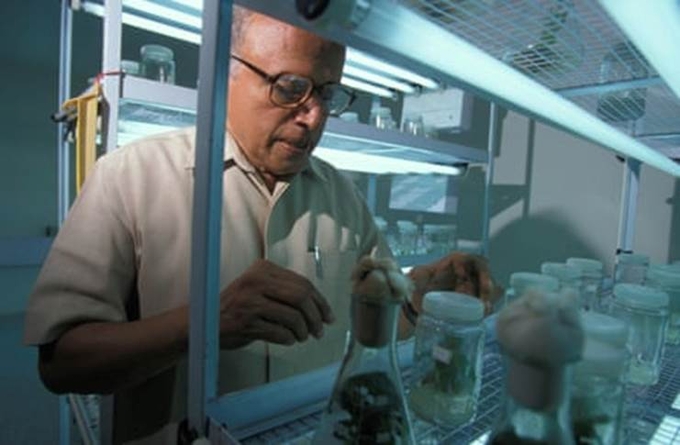
Dr. Swaminathan in the laboratory at the MS Swaminathan Research Foundation in Chennai, India.
Dr. Swaminathan was also a pioneer in the concept of "integration, cooperation, and sharing" in agricultural science. In India, this concept highlighted a fusion of science and indigenous wisdom, and of science and the experience, creativity and understanding of nature from farmers. On the international stage, his vision of collaboration led to his partnership with Dr. Norman Borlaug, the father of the global Green Revolution and a Nobel Peace Prize laureate in 1970 and with the International Rice Research Institute (IRRI) which supported the intiation of the Indian green revolution. During his tenure as the Director General of IRRI from 1982 to 1988, Dr. Swaminathan provided support to many rice-producing countries worldwide, including Vietnam, especially in sharing the genetic resources of rice. Vietnam held a special place in his memories. He recalled that shortly after the reunification of Vietnam, he was dispatched by the Indian government to survey for the establishment of a Rice Research Institute in the Mekong (Cuu Long) Delta, as per the agreement between Prime Ministers Indira Gandhi and Pham Van Dong.
After his survey mission, he had a direct audience with Prime Minister Pham Van Dong to report the findings before returning to India. He reminisced that Prime Minister Pham Van Dong had asked, "Can Vietnam achieve self-sufficiency in rice production?" He responded that through the survey, he had observed a great potential of Mekong Delta, so within a short period, Vietnam could achievem self-sufficiency. This journey laid the foundation for the agricultural cooperation between Vietnam and India, of with the exemplary mark is the establishment and development of the Cuu Long Delta Rice Research Institute. Before his passing, Dr. Swaminathan had returned to Vietnam twice, once in 1984 to sign a collaborative agreement between IRRI, where he served as Director General with Can Tho University and Cuu Long Delta Rice Research Institute (CLRRI). His last visit was in 2000, when he revisited CLRRI with several Indian experts who were employed at this Institute during its early years of establishment.
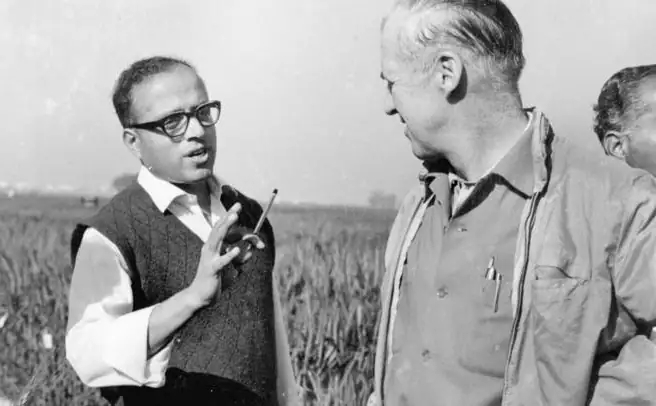
Dr. Swaminathan (left) and Dr. Norman Borlaug in India, 1963.
In his later years, many people eagerly awaited to hear Dr. Swaminathan's views on the future of agriculture in India. He articulated several key perspectives, including:
- Recognizing the pivotal role of agriculture as he stated that “If agriculture goes wrong, nothing will go right” and “future belongs to the countries with grains”.
- Farmers should always be at the center of agricultural development. Accordingly, agricultural solutions should focus on enhancing the income and livelihoods of farmers.
- Protection of natural resources and environment is the foundation of the prosperity for agriculture and farmers in the present and the future.
- The young generation can be attracted to agriculture when there is an integration of the entrepreneurship with scientific and technological innovations within the agricultural sector.
His visionary perspectives are not only relevant to India but also applicable to many other countries worldwide. Dr. Swaminathan's legacy will live on as a guiding star in the hearts of farmers.
Translated by Nguyen Hai Long

(VAN) The project contributes to enhancing the resilience of communities vulnerable to the impacts of climate change, with a primary focus on local women.
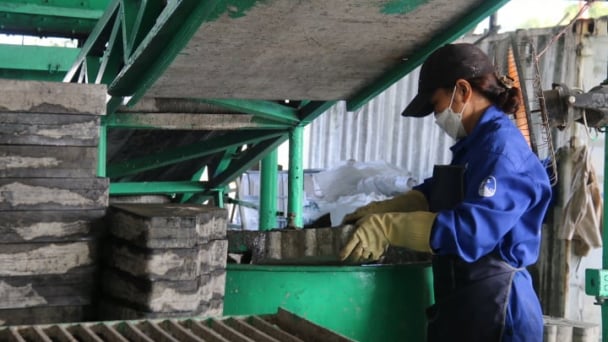
(VAN) Green materials help save energy and resources. However, after more than 10 years, Vietnam has only developed over 200 green buildings with more than 6 million square meters of floor space.
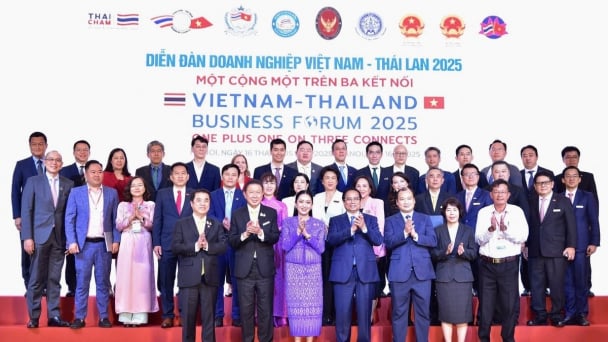
(VAN) Vietnam - Thailand Business Forum 2025: One plus one on three connects, marking a milestone in the comprehensive strategic partnership between the two nations.
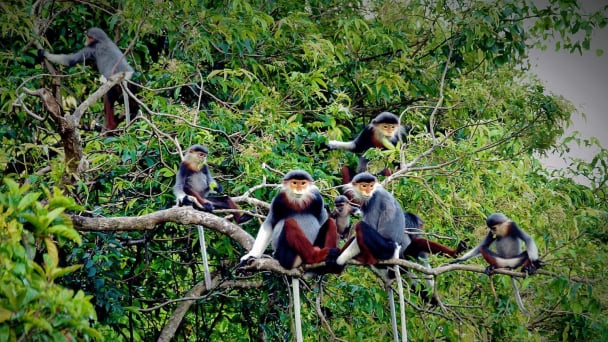
(VAN) The United Nations designated 22 May as the International Day for Biodiversity 2025 with the theme 'Harmony with nature and sustainable development.'
![Multi-channel, multi-directional Vietnamese agricultural markets: [8] A national strategy is needed](https://t.ex-cdn.com/nongnghiepmoitruong.vn/608w/files/phucpm/2025/05/15/1435-thi-truong-nong-san-viet-da-kenh-da-huongbai-8-can-mot-chien-luoc-quoc-gia-084750_728.jpg)
(VAN) The Chairman of Hung Nhon Group shared: ‘Opening up and tapping into new markets is the right and strategic direction for Vietnam's agricultural sector.’

(VAN) Food waste has become a serious issue in modern society, especially in rapidly urbanizing and developing cities like Hanoi.
![Multi-channel, multi-directional Vietnamese agricultural markets: [7] Deep processing makes global reach easy](https://t.ex-cdn.com/nongnghiepmoitruong.vn/608w/files/huytd/2025/05/16/2946-che-bien-sau-chia-khoa-vang-nang-tam-nong-san-viet-tren-ban-do-the-gioi-080603_110-093858.jpg)
(VAN) The application of deep processing technology is helping Vietnamese agricultural products enhance their value, create competitive advantages, and open doors to conquer global consumers.